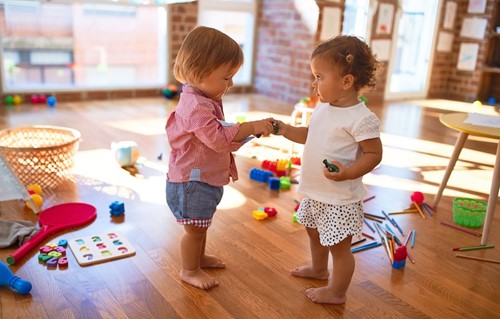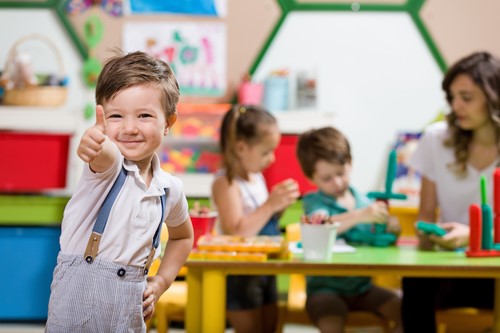What Age Should Your Child Start Preschool?
As a child nears three years, every parent becomes excited about enrolling them on preschool. At this point, a parent wants their child to start interacting with peers, learn new things, and spend more time in a different setting besides home. But the question still stands, is the child ready for preschool?

Before determining if your child is ready for preschool, it’s vital to understand that all children aren’t the same. Some children experience a speedy growth milestone, enabling them to understand and do things without much help from grown-ups. On the other hand, some children depend on their parents to perform simple tasks, even at five. This means while age is among the determiners of whether a child should start preschool, there are other factors to consider before doing so.
When Should Children Begin Preschool?
In most cases, children begin preschool at the age of three. However, some preschools accept the admission of two-and-a-half to four years old children. Nevertheless, this doesn’t necessarily mean a child outside this age bracket should start preschool since every child has special needs.
Whether or not to enrol a child in a 5-star preschool should be based on readiness rather than age. If your child is potty trained at two and a half years old and understands instructions, it may be time to enrol them.
On the other hand, suppose your child experience challenges with milestone development and has yet to learn basic activities at three and above. You might need to rethink enrolling them in a preschool until they’re ready. However, you can always talk to your preferred preschool administration to determine if they accept children experiencing challenges with achieving growth milestones.
Besides Age, What Other Factors Determine If A Child Should Start Preschool?
Aside from age, several factors determine if a child is ready to start preschool. They include:
1. Ability To Use A Potty Effectively
Most preschools accept the enrolment of schoolers already trained to use a potty or at least under training. Children who understand how to care for themselves are easy to work around and unlikely to cause a mess that could endanger their well-being. Besides the ability to use a potty, preschoolers should know how to tie their shoelaces, put on their coats, organise their staff, and wash their hands effectively.
2. Physical Stamina For Preschool Activities
Another vital factor determining if your child is ready for preschool is their ability to engage in different physical activities without difficulty. Preschoolers spend their days jumping, drawing, running, writing, and engaging in creative activities that require robust physical stamina. If your child is used to being busy playing around without complaints, they might be ready for preschool, regardless of whether they’re two and a half or three years.

3. Ability To Spend Some Time Away From The Parent
If you’ve been leaving your child in a daycare or with a babysitter, they might easily transition to preschool without difficulty. Children who are used to spending time away from their parents are unlikely to develop separation anxiety compared to those who spend much time with their guardians after starting preschool.
Nevertheless, the fact that your child is used to spending too much time around you doesn’t necessarily mean they aren’t ready for preschool. Most preschools hire professional teachers trained in helping children transition from being around parents or guardians to spending time with peers and other individuals. That said, you shouldn’t worry about your child since they’ll be around professionals ready to make their early learning fun.
4. Excellent Communication Skills
A child looking forward to starting preschool should at least be able to explain themselves. They’ll need help from classmates and teachers, which is only possible if they communicate their needs. If your child still experiences challenges expressing themself, they might need a little more time before enrolling in preschool.
Communication is a tough nut to crack, but once they open up, they're quite communicative with their peers," says Zach Isaak of Uzzle, a company that specialises in children's cognitive development. "Encouraging them to communicate their thoughts and feelings, plus exposing them to situations where they can communicate in a safe space, like a board game, family party, or even just one-on-one with you can go a long way to helping them learn to communicate with other children at preschool.
5. Ability To Follow Instructions
While there are no strict rules in preschools, there are simple guidelines and instructions learners must adhere to. For example, there’s time for preschoolers to go to the bathroom, have snacks, walk in a line, sleep, read, play, and perform other activities. Before enrolling your child into preschool, ensure they can follow simple instructions to avoid challenges when they begin schooling.
If you think your child is yet to learn how to follow guidelines, start directing them into following some rules before they start preschool. You can begin by drawing a timetable showing when to eat, sleep, and play. Within a while, they’ll begin to follow directions without challenges and be ready for preschool.
Conclusion
While most children begin preschool at three or four, some start as early as two and a half years. Nevertheless, this doesn’t necessarily mean all children between three and four years should start preschool, especially since every child has different needs.
Suppose your child has attained school-going years, but you think they aren’t ready for it. Don’t beat yourself around it. Study the areas requiring improvement, help the child work around them, and enrol them in preschool only after they’re ready. You can also talk to your preferred preschool administration to learn how they can help your child start preschool if they aren’t prepared but should be in preschool.